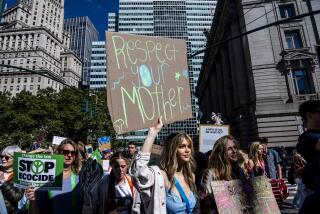Youth Leaders From Many Nations Meet to Discuss Future
- Share via
LOS ANGELES — About three dozen high school and college students from such countries as Brazil, Uzbekistan and the Seychelles on Monday called for an international effort to improve education, the environment and to control population growth.
The gathering, held in a sunny amphitheater off Mulholland Drive, was attended by some of the 700 future leaders who were passing through Los Angeles on their way home from the Millennium Young People’s Congress in Hawaii.
The Congress, which featured student delegates from more than 100 counties, was held last week and was sponsored by the United Nations and two other organizations--Youth for Environmental Service and Peace Child International.
“Our intention is to create a global, grass-roots movement that inspires youths to become activists and the next world leaders,” said Debra Olson, who organized Monday’s gathering and is the parent of two girls involved in the movement.
Actor Edward James Olmos hosted Monday’s event and said he believed those involved, children as young as 13, need to feel “real empowerment” to solve their regions’ major economic and social issues.
Actor LeVar Burton, who served as a mentor to the young people in Hawaii, said he was moved by their passion and impressed by their grasp of the issues.
“The future is in good hands,” Burton said.
The group of international teens talked Monday to about 100 students and teachers at Berkeley Hall, a private school that runs through ninth grade. The young leaders stressed the need for education in their homelands, where other pressing concerns often get more attention.
Oliver Shalala, a 23-year-old college student from the African nation of Zambia, said schooling has taken a back seat to the economic needs of his country, as well as much of Africa.
In Zambia, he said, most children attend public school only through the fifth grade. Education is government subsidized, but parents must also pay a fee. And since schooling is not required by law, many parents prefer to spend their money on food and other needs.
The result is a low literacy rate, about 48% among adults, Shalala said. And out of the nation’s population of about 9 million, only about 6,000 adults make it as far as college each year.
More to Read
Sign up for Essential California
The most important California stories and recommendations in your inbox every morning.
You may occasionally receive promotional content from the Los Angeles Times.













